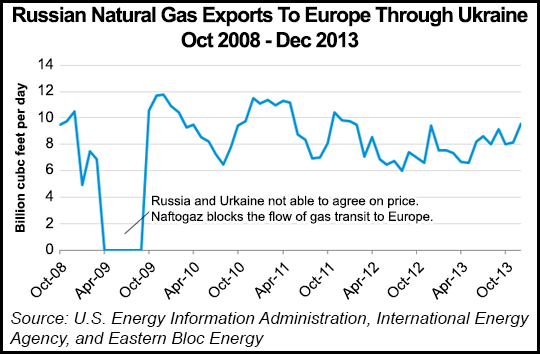Regulatory | LNG | Markets | Natural Gas Prices | NGI All News Access
16% of Europe’s Natural Gas Flows Through Ukraine, EIA Estimates
The U.S. Energy Information Administration (EIA) on Friday said it believes that 16% of the natural gas consumed in Europe in 2013 was transported through pipelines that traverse Ukraine.

In a “Today in Energy” brief, the EIA said Europe — which it classified as all 28 members of the European Union (EU), plus Norway, Switzerland, Turkey and the Balkan states that are not EU members — collectively consumed 18.7 Tcf of gas in 2013. Russia supplied 30% (5.7 Tcf) of that volume, 3.0 Tcf of which was transported across Ukraine via pipelines.
The EIA based its estimates on information it received from Russia’s Gazprom and Eastern Bloc Energy.
According to the EIA, three major pipeline systems carry Russian gas through Ukraine to Europe. The Bratstvo pipeline, Russia’s largest to Europe, crosses Ukraine and enters Slovakia, where it splits in two to supply northern and southern Europe. The Soyuz pipeline, which supplies central and northern Europe, provides a link between Russian pipelines and gas networks in Central Asia. The Trans-Balkan pipeline delivers gas to the Balkans and Turkey.
“In the past, as much as 80% of Russian natural gas exports to Europe transited Ukraine,” the EIA said. “This number has fallen to 50-60% since the Nord Stream pipeline, a direct link between Russia and Germany under the Baltic Sea, came online in 2011.”
The EIA said the amount of Russian natural gas that flows through Ukraine varies by season, ranging from nearly 12 Bcf/d in winter but only 6 Bcf/d in summer. As a consequence of an unusually mild winter in 2013, gas flows through Ukraine were lower and the amount of gas in storage in Europe increased to 46% of capacity. By comparison, the amount of natural gas in storage in the United States was 23% during the winter of 2013.
Last week, the ambassadors of four central European countries urged Congress to expedite the permitting process for liquefied natural gas (LNG) exports to Europe (see Daily GPI, March 10a). The U.S. currently has no exportable LNG. But a senior adviser to the United States Energy Security Council said the U.S. should do just the opposite: back away from LNG export plans and instead focus on converting more light-duty vehicles to run on compressed natural gas (CNG) to back out imported oil (see Daily GPI, March 10b).
Russia triggered an international crisis with its smaller neighbor in late February. Following a revolution in the Ukrainian capital of Kiev, Russian forces seized control of the Crimean Peninsula, which the international community considers Ukrainian territory. Pro-Russian citizens in Crimea have since scheduled a referendum on whether to secede from Ukraine.
© 2024 Natural Gas Intelligence. All rights reserved.
ISSN © 1532-1231 | ISSN © 2577-9877 |
